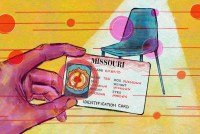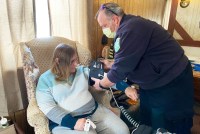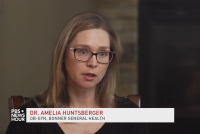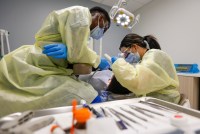Latest Morning Briefing Stories
Legal Pot Is More Potent Than Ever — And Still Largely Unregulated
As marijuana has become far more mainstream, potent, and sometimes dangerous, uneven regulation at the state and federal levels leaves consumers at risk.
California Debates Extending PTSD Coverage to More First Responders
A state Senate bill would extend workers’ compensation coverage of post-traumatic stress injuries for firefighters and police officers. But a separate bill to cover paramedics and EMTs is unlikely to be heard.
On the Night Shift With a Sexual Assault Nurse Examiner
Montana and other states are trying to increase the number of nurses specially trained to treat survivors of sexual assault.
Medi-Cal Enrollees in California: Here’s How to Verify Your Eligibility
California’s safety-net health program has resumed annual eligibility checks after three years, which means beneficiaries will need to provide updated personal information to maintain coverage. Here’s what to watch for.
In Idaho, Taking a Minor Out of State for an Abortion Is Now a Crime: ‘Abortion Trafficking’
Under the nation’s first law of its kind, teens must have parental consent to travel for medical care, including in cases of sexual assault or rape. Any adult, including an aunt, grandparent, or sibling, convicted of violating the criminal statute faces up to five years in prison — and could be sued for financial damages.
Walensky to Leave CDC in June as Covid Emergency Winds Down
The Centers for Disease Control and Prevention director presided over one of the most tumultuous times in the agency’s history, struggling to regain public trust after it was revealed that Trump officials intervened in its pandemic response.
California Says New Cigarettes Appear to Violate State’s Flavored Tobacco Ban
The attorney general is warning two tobacco companies, R.J. Reynolds and ITG Brands LLC, that their reformulated cigarettes appear to violate the state’s ban on flavored tobacco products, based on marketing materials. R.J. Reynolds said Thursday that its cigarettes comply with the law.
Can a Fetus Be an Employee? States Are Testing the Boundaries of Personhood After ‘Dobbs’
Laws granting rights to unborn children have spread in the decades since the U.S. and Missouri supreme courts allowed Missouri’s definition of life as beginning at conception to stand. Now, a wrongful death lawsuit involving a workplace accident shows how sprawling those laws — often intended to curb abortion — have become.
Lead Contamination Surfaces in Affluent Atlanta Neighborhood
The Environmental Protection Agency recently confirmed high lead levels in an upscale Atlanta neighborhood. The location stands in contrast to many polluted sites investigated by the federal Superfund program — often in former industrial or waste disposal areas where environmental racism has left marginalized groups at risk.
What the Health? From KFF Health News: Health Programs Are at Risk as Debt Ceiling Cave-In Looms
A warning from the Treasury Department that the U.S. could default on its debt as soon as June 1 has galvanized lawmakers to intervene. But there is still no obvious way to reconcile Republican demands to slash federal spending with President Joe Biden’s demand to raise the debt ceiling and save the spending fight for a later date. Meanwhile, efforts to pass abortion bans in conservative states are starting to stall as some Republicans rebel against the most severe bans. Joanne Kenen of the Johns Hopkins Bloomberg School of Public Health and Politico, Rachel Cohrs of Stat, and Alice Miranda Ollstein of Politico join KFF Health News chief Washington correspondent Julie Rovner to discuss these issues and more.
Colorado Becomes the First State to Ban So-Called Abortion Pill Reversals
The controversial practice of administering progesterone to people after they have taken the abortion pill mifepristone may be coming to an end in Colorado. Pills have emerged as the latest front in the war over abortion since the U.S. Supreme Court overturned Roe v. Wade last summer.
Gun Assault Rates Doubled for Children in 4 Major Cities During the Pandemic, New Data Shows
A study of roughly 2,700 shootings in Chicago, Los Angeles, New York, and Philadelphia found that racial disparities in gun injuries and deaths widened during the covid-19 pandemic. Researchers looked only at assaults, excluding accidents or incidents of self-harm.
Biden Administration Issues New Warning About Medical Credit Cards
Americans paid an estimated $1 billion in deferred interest on medical debt in just three years, the Consumer Financial Protection Bureau reports. The agency warns against medical credit cards, which are often pitched right in doctors’ offices.
Ask a Chatbot: ‘What’s for Dinner?’
The AI program ChatGPT can save time and energy spent meal planning, especially for people with dietary restrictions. But be sure to double-check its work, users say.
Federal Rules Don’t Require Period Product Ingredients on Packaging Labels. States Are Stepping In.
New York and California have passed laws requiring disclosure of ingredients on menstrual product packaging. Advocates want more transparency across the U.S.
Community Paramedics Don’t Wait for an Emergency to Visit Rural Patients at Home
Community paramedicine is expanding nationwide, including in rural areas, as health care providers, insurers, and state governments recognize its potential to improve health and save money.
The Nation’s Health Secretary Has This Doctor on Call
Carolina Reyes, a physician who specializes in high-risk pregnancies, says providers and health systems have a role in tackling systemic racism. She’s also married to U.S. Health and Human Services Secretary Xavier Becerra.
After Idaho’s Strict Abortion Ban, OB-GYNs Stage a Quick Exodus
At least two Idaho hospitals are ending labor and delivery services, with one citing the state’s “legal and political climate” and noting that “recruiting replacements will be extraordinarily difficult” as doctors leave.
Listen: How Are States Spending Money From the Opioid Settlements? It’s Not Easy to Know
KFF Health News senior correspondent Aneri Pattani appeared on NPR’s “1A” on May 1 to discuss issues related to how opioid settlement funds are being distributed.
Millions Are Stuck in Dental Deserts, With No Access to Oral Health Care
Vulnerable and marginalized communities are getting left behind in dental deserts, where patient volume exceeds provider capacity or too few dentists are willing to serve the uninsured or those on Medicaid.


























